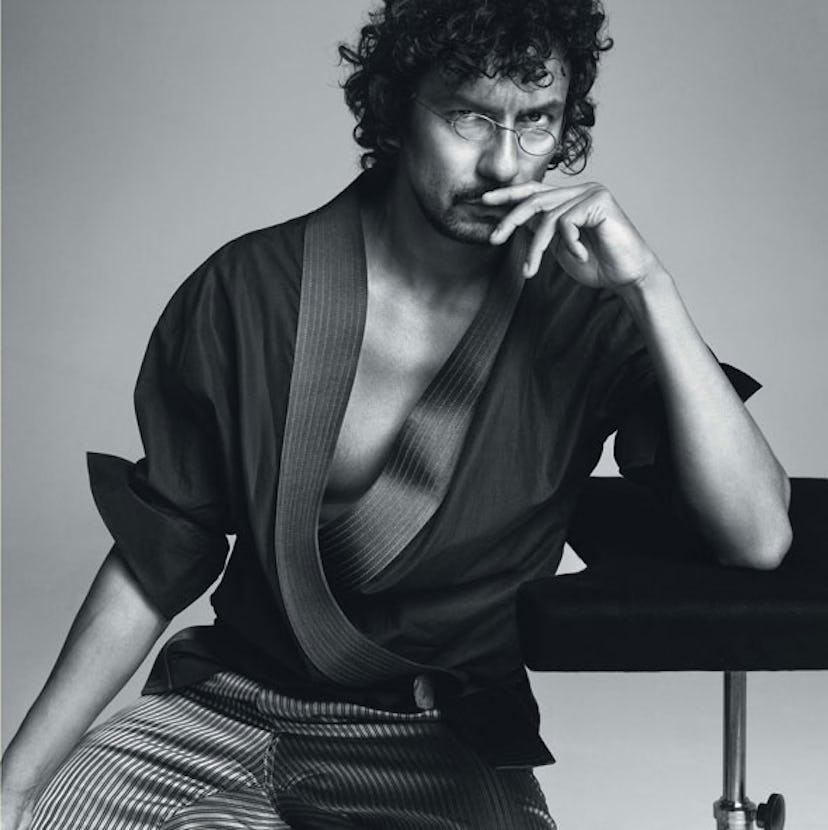Haider Ackermann
When Karl Lagerfeld was recently asked who he’d most like to see succeed him at Chanel, he didn’t hesitate: “Haider Ackermann.”

When Karl Lagerfeld was recently asked who he’d most like to see succeed him at Chanel, he didn’t hesitate: “Haider Ackermann.” Ackermann has been tinkering with the luxuriously déshabillé dresses and short, sharp jackets that have made him a cult favorite. But with his spring collection came something else—glowing reviews, scores of new fans, and a sense that, at age 39, the Paris-based designer has truly hit his stride.
Why did you become a fashion designer? We’re all in search of something. My search is for beauty, and that’s very important nowadays. My father works for Amnesty International, and of course we need people like him, but we also need people who are searching for beauty.
Does your father approve of what you do? Well, yes. Of course there is this disdain about fashion. People always smile when you talk about it.
How do you explain your clothes to people who are skeptical of them? I’m looking for a luxury that’s a bit négligé, that can be rich but doesn’t look rich. I would love for my clothes to be timeless, for people to build a sense of intimacy with them over time. I’ve tried over the years to tell a story, with each collection a different chapter. And you hope the reader will follow you and see where the novel’s going.
You were born in Colombia, adopted by French parents, raised in Africa and the Middle East, and educated in Antwerp. How has your background influenced you? It was very nomadic, which gave me the ability to fit in everywhere. But it was also very unstable and, as a result, tormenting. It belongs to my past. Of course it’s who I am, but it’s misty over there.
Would your mother ever wear your clothes? The collection is quite hard. You need to have a kind of attitude to wear it. An attitude more than anything else makes a woman beautiful.
What is that attitude, in a word? Discretion. Although the clothes don’t look discreet, I’m very attracted to the woman who is sitting in a corner of the restaurant observing. The woman I’m attracted to wouldn’t stand in the middle of the crowd and have all eyes drawn to her.
So how did you feel when you saw pictures of Tilda Swinton wearing your dress at Cannes? One can only be honored and flattered. What I like about the relationship I have with Tilda is that it’s a human exchange, a friendship. It’s not just about sending a dress and hoping she’s going to wear it. There are emotions involved.
Do you believe in the idea of the muse? No. Because a muse is a very silent person. The woman I’m attracted to is most of the time very well-spoken.
What else do you like to do apart from designing clothes? I like to wander the streets at night. It’s about escaping and dreaming at the end of the day.
Do clothes help people reveal themselves or hide themselves? Hide, but it’s a duality: You hide but try to make yourself beautiful.
Are you interested in making clothes that are sexy? Yes, but for me at the moment, a woman’s manly side is what’s sexy. And I’m not talking about androgyny. I think that a woman standing strongly, fighting to be desired, is very sexual.
What’s the most womanly thing about you? My hands. But other people might say my dreamy, romantic side.
You talk about your collections as a book. What was this latest chapter? The Ackermann woman was always in the shadows—it was always kind of dark. But I’m going through a good period in my life, and there is a nonchalance where the clothes are less strangled, more relaxed.
What are you so happy about? I may be in love.
Is the Ackermann woman a woman in love? Well, this season she decided to commit a small act of violence by showing that she exists—by wearing bright colors.
Why do you call that violence? To show yourself is rather violent. But while she is in the light, she can be silent. It’s like a Visconti movie: hardly any words but a presence.
In Visconti movies, people suffer but look fantastic doing it. Those are two important aspects of life. We have heavy hearts sometimes, but we still want to be desired.
Generation Now
“Simulation of sex is a real workout. We must have done a hundred takes. There was an oxygen tank at one point.”
“A great amount of good is always evened out by a great amount of bad. I find it’s best to acknowledge that weird balance.”
“A woman’s manly side is what’s sexy—a woman standing strongly, fighting to be desired.”
“I feel Latin music has been stuck in a certain place. I just wanted to make it more progressive.”
“I’m comfortable with the idea that I’m the flavor of the moment and that in a couple of years people might not think I’m cool anymore.”
“In South Africa people know what we are straightaway. But in America they’re like, ‘What is this?’”